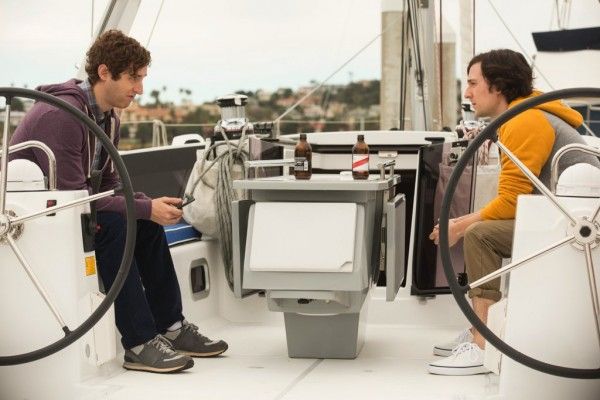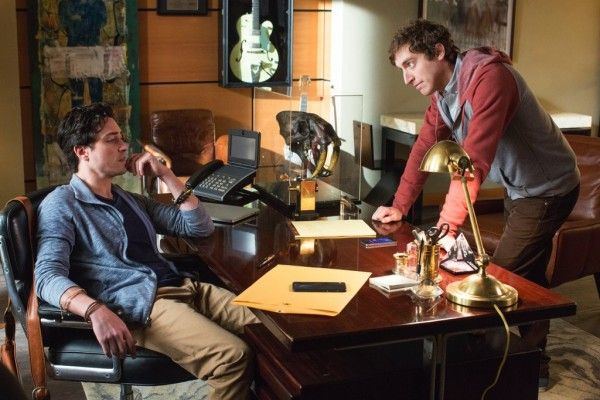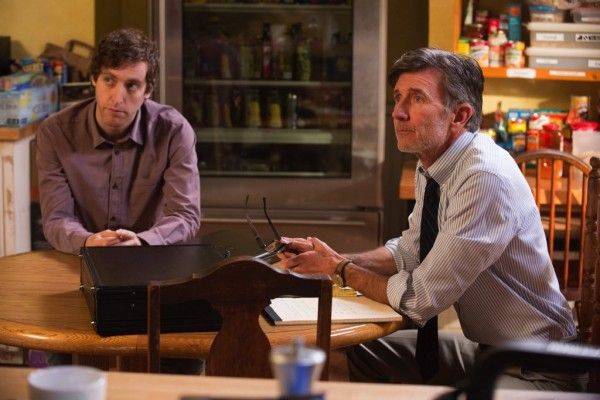And we’re back. After the mediocre-at-best “White Hat/Black Hat” found Pied Piper losing the porn business that could have saved them, Silicon Valley's “Binding Arbitration” plumbs far more morally complex material as a simple twist of fate suddenly gives Richard and Pied Piper the upper hand in their court case with Hooli. After being confronted at a restaurant by two resentful Nucleus employees, who understand that he does next to nothing, Big Head notices one of them has left their Hooli phone under their plate, which has the beta version of Nucleus on it. The phone is proof of Gavin Belson’s egotistical emptiness, that he’s been spending millions on a piece of tech that not only doesn’t work but seems to actually damage other parts of the smart phone. This results in a rather hysterical phone meeting between Richard and Gavin, in which both parties are made to constantly reign in their not-so-pleasant feelings for one another by their lawyers to ensure nothing shows up in the discovery phase. Again, the show exemplifies how personal ideas and opinions must be tempered to ensure that businesses (read: money) remain safe.
The phone conversation ends with Hooli and Pied Piper agreeing to binding arbitration, a quickened version of a trial, to settle the matter. Enter the great Matt McCoy, who you may remember as the second Lloyd Braun in Seinfeld, as Jerry Sunshine, Pied Piper’s new litigator, who lost his license to practice law after being caught with enough drugs to make Keith Richards go white with fear. Despite being now homeless, it turns out Jerry is a great litigator, and he charts a great defense for Richard and Pied Piper, one that Ehrlich is hell-bent on torpedoing so that he gets his day in court to prove that his “incubator” is a success. The episode essentially pits Jerry and Ehrlich against one another, and though it’s a bit obvious, the clear intent is to show that the man with no money, working for next to nothing, is the harder worker and the all around better person than the rich, fat brat who refuses to realize that he’s a misogynistic, egotistical moron.
As they prepare for the case, the rest of the Pied Piper crew take on another classic conundrum, as Gilfoyle teaches Jared about the Schrödinger's cat paradox, a thought experiment that any philosophy or physics major will be familiar with. This comes to involve the condor that Pied Piper has been keeping an eye on with their streaming algorithm, but it also comes to mirror the discovery of the Hooli phone. By looking at Nucleus and seeing how bad it is, Richard becomes partially at fault for Belson’s disaster, leading him into a handful of unfortunate moral questions, the most prominent of which is the revelation that he did work on Pied Piper (for one, single day) while working at Hooli. The reveal comes out via another confusion of the personal and the professional, as Richard is found to refer to his laptop, where he built the Pied Piper algorithm, as his girlfriend.
The episode lacks some more substantial interactions with Dinesh, Gilfoyle, and Jared, like those in “Homicide” and “Server Space,” but it’s made up for by the superbly written trial sequences. After putting Big Head on the stand with his reliably amusing aloofness, Jerry Sunshine agrees to put Ehrlich on the stand, only to then rip him to shreds over his past idiocies, including his initial dislike of Pied Piper and fondness for a tasteless, self-explanatory app called Nip Alert. For the most part, Ehrlich’s testimony does exactly what Jerry hopes it does but he ends by outing the fact that Richard worked on Pied Piper at Hooli to the prosecutors. It’s a great scene, the first of hopefully several culminations of Ehrlich’s crass pomposity coming back to bite him. It also sets Richard up for a moral experiment that puts the very essence of business law in question.
Ehrlich tells Richard to simply lie when they ask if he worked on Pied Piper at Hooli, which weirdly does seem like the most reasonable course of action. As Richard points out, all he did was work on one piece of code while under Belson, and in terms of business law, that means Belson essentially owns Pied Piper. That’s not unfair; that’s simply insane. And yet, Richard does the morally correct thing and admits that he worked on his algorithm at Hooli, and the episode ends with both Richard and the audience unsure of the Pied Piper’s fate. Richard’s admission is one of the more sincere and touching moments that Silicon Valley has produced this season, seeing a great inventor being crushed both by a moment of weakness and the uncaring, deeply ridiculous contours of capitalism in the digital age, and reasserts the series’ dead-on reputation as one of the most thoughtful and progressive comedies on television.
★★★★ Very good




